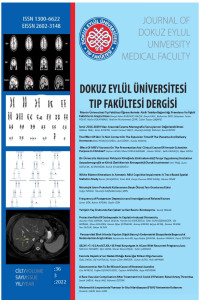Öz
Bu olgu sunumunda, fasciola hepatica’nın nonspesifik semptomlarla gelebileceğini; karaciğer kitlesi ile başvuran bir hastada ayırıcı tanıda paraziter enfeksiyonların akılda tutulması gerektiğini; laboratuvar bulguları, seroloji ve görüntüleme yöntemlerinin tanıda değerli olduğunu vurgulamayı amaçladık. Komorbidi olmayan 33 yaşında kadın hasta dış merkezden tarafımıza karaciğerde kitle nedeniyle yönlendirildi. Hastanın ana yakınmaları halsizlik, yorgunluk ve künt vasıfta karın ağrısı olup fizik muayenesi olağandı. Laboratuvar tetkiklerinde anemi ve eozinofili saptandı. Fasciola hepatica serolojisi pozitif olarak saptandı. Abdomen manyetik rezonans görüntülemede;T1 ağırlıklı yağ baskılı sekansta karaciğerde izlenen lezyonda paraziter hastalığın oluşturduğu intraparankimal tünelleri temsil eden tubuler yapıda mikrokistik lezyon izlendi. Hepatobilier konseyde Fasciola hepatica olarak değerlendirilen hastaya triklabendazol tedavisi verildi. Sonuç olarak; eozinofili ile birlikte karaciğer kitlesi ile başvuran hastalarda, ayırıcı tanıda paraziter enfeksiyonlar akılda bulundurulmalıdır. Laboratuvar bulguları, seroloji ve görüntüleme yöntemleri tanıda değerlidir.
Anahtar Kelimeler
Kaynakça
- Yılmaz B, Köklü S, Gedikoğlu G. Case Report : Hepatic Mass Caused by Fasciola Hepatica : A Tricky Differential Diagnosis. Am J Trop Med Hyg. 2013;89(6):1212–3.
- Webb CM, Cabada MM. Recent developments in the epidemiology, diagnosis, and treatment of Fasciola infection. Curr Opin Infect Dis. 2018;31(5):409–14.
- Mas-Coma S. Epidemiology of fascioliasis in human endemic areas. J Helminthol. 2005;79(3):207–16.
- Kaya M, Beştaş R, Çetin S. Clinical presentation and management of Fasciola hepatica infection: Single-center experience. World J Gastroenterol. 2011;17(44):4899.
- Koç Z, Ulusan Ş, Tokmak N. Hepatobiliary fascioliasis: Imaging characteristics with a new finding. Diagnostic Interv Radiol. 2009 Dec;15(4):247–51.
- Espinoza JR, Timoteo O, Herrera-Velit P. Fas2-ELISA in the detection of human infection by Fasciola hepatica. J Helminthol. 2005 Sep;79(3):235–40.
- Mertens J, Weber A, M¨ullhaupt B, Geier A. Liver International Image. Liver Int ISSN. 2011;1478(3223):666.
- Dias LM, Silva R, Viana HL, Palhinhas M, Viana RL. Biliary fascioliasis: diagnosis, treatment and follow-up by ERCP. Gastrointest Endosc. 1996 Jun;43(6):616–20.
- Adachi S, Kotani K, Shimizu T, Tanaka K, Shimizu T, Okada K. Asymptomatic fascioliasis. Intern Med. 2005;44(9):1013–5.
- Keiser J, Utzinger J. Chemotherapy for major food-borne trematodes: a review. Expert Opin Pharmacother. 2004 Aug;5(8):1711–26.
- Rinaldi L, Folliero V, Restivo L, Foglia F, Franci G, Chianese A, et al. Atypical Presentation of a Rare Parasitic Infection with Fasciola hepatica: A Multidisciplinary Case Report. Am J Case Rep. 2020 Sep 16;21:1–6.
- Richter J, Freise S, Mull R, Millán JC. Fascioliasis: sonographic abnormalities of the biliary tract and evolution after treatment with triclabendazole. Trop Med Int Health 1999; 4:774.
- Hien TT, Truong NT, Minh NH et al. A randomized controlled pilot study of artesunate versus triclabendazole for human fascioliasis in central Vietnam. Am J Trop Med Hyg. 2008;78(3):388–392.
Öz
In this case report, it was stated that fasciola hepatica may present with nonspecific symptoms; parasitic infections should be kept in mind in the differential diagnosis of a patient presenting with a liver mass; We aimed to emphasize that laboratory findings, serology and imaging methods are valuable in diagnosis. A 33-year-old female patient without comorbidity was referred to us from an external center because of a liver mass. The patient's main complaints were weakness, fatigue and blunt abdominal pain, and his physical examination was normal. Laboratory tests revealed anemia and eosinophilia. Fasciola hepatica serology was positive. In the abdominal magnetic resonance imaging, a tubular microcystic lesion representing the intraparenchymal tunnels formed by the parasitic disease was observed in the liver lesion in the T1-weighted fat-suppressed sequence. The patient, who was evaluated as Fasciola hepatica in the hepatobiliary council, was given triclabendazole treatment. As a result; parasitic infections should be kept in mind in the differential diagnosis of patients presenting with eosinophilia and a liver mass. Laboratory findings, serology and imaging methods are valuable in diagnosis.
Anahtar Kelimeler
Kaynakça
- Yılmaz B, Köklü S, Gedikoğlu G. Case Report : Hepatic Mass Caused by Fasciola Hepatica : A Tricky Differential Diagnosis. Am J Trop Med Hyg. 2013;89(6):1212–3.
- Webb CM, Cabada MM. Recent developments in the epidemiology, diagnosis, and treatment of Fasciola infection. Curr Opin Infect Dis. 2018;31(5):409–14.
- Mas-Coma S. Epidemiology of fascioliasis in human endemic areas. J Helminthol. 2005;79(3):207–16.
- Kaya M, Beştaş R, Çetin S. Clinical presentation and management of Fasciola hepatica infection: Single-center experience. World J Gastroenterol. 2011;17(44):4899.
- Koç Z, Ulusan Ş, Tokmak N. Hepatobiliary fascioliasis: Imaging characteristics with a new finding. Diagnostic Interv Radiol. 2009 Dec;15(4):247–51.
- Espinoza JR, Timoteo O, Herrera-Velit P. Fas2-ELISA in the detection of human infection by Fasciola hepatica. J Helminthol. 2005 Sep;79(3):235–40.
- Mertens J, Weber A, M¨ullhaupt B, Geier A. Liver International Image. Liver Int ISSN. 2011;1478(3223):666.
- Dias LM, Silva R, Viana HL, Palhinhas M, Viana RL. Biliary fascioliasis: diagnosis, treatment and follow-up by ERCP. Gastrointest Endosc. 1996 Jun;43(6):616–20.
- Adachi S, Kotani K, Shimizu T, Tanaka K, Shimizu T, Okada K. Asymptomatic fascioliasis. Intern Med. 2005;44(9):1013–5.
- Keiser J, Utzinger J. Chemotherapy for major food-borne trematodes: a review. Expert Opin Pharmacother. 2004 Aug;5(8):1711–26.
- Rinaldi L, Folliero V, Restivo L, Foglia F, Franci G, Chianese A, et al. Atypical Presentation of a Rare Parasitic Infection with Fasciola hepatica: A Multidisciplinary Case Report. Am J Case Rep. 2020 Sep 16;21:1–6.
- Richter J, Freise S, Mull R, Millán JC. Fascioliasis: sonographic abnormalities of the biliary tract and evolution after treatment with triclabendazole. Trop Med Int Health 1999; 4:774.
- Hien TT, Truong NT, Minh NH et al. A randomized controlled pilot study of artesunate versus triclabendazole for human fascioliasis in central Vietnam. Am J Trop Med Hyg. 2008;78(3):388–392.
Ayrıntılar
| Birincil Dil | Türkçe |
|---|---|
| Konular | Gastroenteroloji ve Hepatoloji |
| Bölüm | Olgu Sunumları |
| Yazarlar | |
| Yayımlanma Tarihi | 27 Ocak 2023 |
| Gönderilme Tarihi | 18 Eylül 2022 |
| Yayımlandığı Sayı | Yıl 2022 Cilt: 36 Sayı: 3 |

